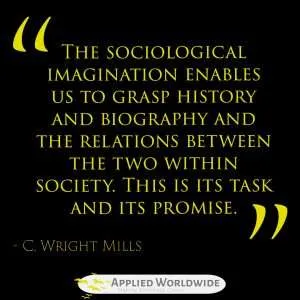The sociological imagination, a concept developed by C. Wright Mills, encourages us to bridge personal experiences with broader social structures and historical forces. In the subfield of sociology of religion, this concept takes on a unique and profound meaning. It challenges us to examine how individual beliefs, religious affiliations, and spiritual experiences intersect with the intricate dynamics of religion in society.
In this blog post, we will explore compelling examples that illustrate the sociological imagination within the context of the sociology of religion, emphasizing the profound influence of religious beliefs and practices on both individuals and society.

Grasping the Sociological Imagination
Core Ideas of the Sociological Imagination
The sociological imagination urges us to consider the interplay of three dimensions:
- Biography: Our personal experiences, religious beliefs, and spiritual journeys.
- History: The broader historical context of religious movements, reformations, and societal changes.
- Social Structure: The overarching social systems, institutions, and norms that shape religious practices and influence individual lives.
Through this framework, we gain a deeper understanding of how personal religious experiences relate to societal and historical factors.
Sociological Imagination in the Sociology of Religion
In the sociology of religion, the sociological imagination helps us to uncover the intricate connections between personal religious beliefs and broader societal structures. Let’s explore some examples that showcase this dynamic relationship:
1. The Rise of Evangelicalism
Biography: A devout Christian in the United States experiences a religious awakening and identifies as an evangelical Christian.
History: Understanding the historical context of the rise of evangelicalism in the U.S., including the Great Awakening and the influence of religious figures like Billy Graham.
Social Structure: Recognizing how evangelicalism is influenced by broader social structures, such as its impact on political movements, cultural shifts, and the shaping of religious communities.
Through the sociological imagination, we see that personal religious experiences and affiliations are deeply connected to the historical and social context in which they occur.
2. Religious Fundamentalism
Biography: An individual embraces religious fundamentalism as their way of life, adhering to strict religious doctrines and practices.
History: Examining the historical development of religious fundamentalism as a reaction to modernity, including its emergence in various faith traditions.
Social Structure: Recognizing how religious fundamentalism is tied to broader social structures, such as its role in social conservatism, moral and political movements, and religious communities.
The sociological imagination helps us see that personal choices to embrace religious fundamentalism are deeply intertwined with historical and social forces that shape this religious worldview.
3. Religious Pluralism
Biography: An individual encounters diverse religious traditions, interacts with people of different faiths, and questions their own beliefs.
History: Understanding the historical context of religious pluralism, including globalization, migration, and interfaith dialogues.
Social Structure: Recognizing how religious pluralism is connected to broader social structures, such as its influence on tolerance, social cohesion, and cultural diversity.
Through the sociological imagination, we see that personal experiences of encountering religious diversity are deeply entwined with historical and social shifts toward greater religious pluralism and globalization.
Final Thoughts on the Sociological Imagination and the Sociology of Religion
The sociological imagination, when applied to the sociology of religion, illuminates the intricate connections between personal religious beliefs and broader societal structures. Through examples like the rise of evangelicalism, religious fundamentalism, and encounters with religious pluralism, we gain insights into how individual religious experiences and affiliations are deeply shaped by historical developments and social forces that may often seem invisible.
Understanding the sociological imagination within the context of religion empowers us to recognize and navigate the interplay of personal spiritual journeys with larger societal forces. In the pursuit of religious understanding and coexistence, the sociological imagination becomes a powerful tool for personal and social transformation, urging us to explore the profound influence of religious beliefs and practices on both individuals and society.







